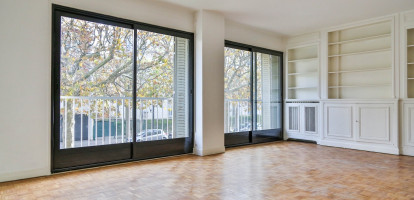Finding an apartment for rent in Paris can often be challenging, especially for expats who just come to France and still need a solid financial background or a stable income in France. That's why it's so important to have a Rental Guarantor, a vital element in the rental process in France.
A Guarantor, usually a financially stable person such as a family member or close friend, agrees to take responsibility for the tenant's obligations in the event of default, guaranteeing the landlord's recourse in case of non-payment or damage. It is often a must, especially in Paris, where landlords prioritize security and insurance due to strict legal protection for tenants, complex rent recovery, and expulsion procedures. and having a guarantor or even an excellent one. Rental guarantor offers landlords peace of mind and helps tenants have a better chance of getting the apartment rental, especially students, expatriates, freelancers, etc.
What is a guarantor and what is its role?
Definition of a guarantor and its responsibilities:
There are two different types of guarantors in France: the simple guarantor (caution simple) and the joint guarantor (caution solitaire).
Simple guarantor (caution simple):
With a simple guarantor, the landlord must first approach the tenant in case of late rent or late rental charges payment. The landlord has to send the tenant an official order to pay (commandement de payer) by a bailiff and send a copy to the guarantor to keep them informed and make full use of all the possible remedies in the case of unpaid rent. If this rent recovery procedure is unsuccessful, the landlord can turn to the guarantor for redress.
Joint guarantor (caution solidaire)
With a joint agreement and several guarantors, the landlord can directly contact the tenant's guarantor once the tenant does not pay their rent. Landlords in France widely favor a joint guarantor because the unpaid rent recovery process is quicker, and the guarantee is more secure.
Why do you need a guarantor for renting an apartment in France?
Legally speaking, having a guarantor for renting an apartment in France is not compulsory, and it is possible to rent without a guarantor! Yet landlords in France always favor candidates who provide a guarantor to minimize future risks. In the highly competitive Paris rental market, where you may quickly find yourself competing with at least ten or even 20 other applicants for the same rental apartment, having a suitable guarantor is practically an obligation. This unwritten rule can give you a significant advantage.
Common situations requiring a guarantor (students, first job, etc.) to rent an apartment in Paris
Students: Many students, especially international students, need a steady income to be more appealing to landlords, who prioritize profiles with stable jobs and financial stability. Consequently, to rent an apartment in Paris, students often must have a guarantor, typically a parent or family friend, to assure the landlord they will cover the rent payments throughout the lease.
Individuals during the work trial period: A typical scenario that often requires a guarantor when renting an apartment in France is that of people on work probation. Most landlords in France may not consider individuals during the work trial period to have a stable professional status and, thus, stable income. Therefore, the presence of a guarantor can provide the necessary reassurance to landlords about the reliability of rent payments, helping people on a trial period to rent an apartment in Paris despite their temporary employment status.
First-Time Job Seekers: Individuals embarking on their first job may encounter difficulties proving their financial stability to landlords. Without a consistent income or employment history, landlords may view them as higher-risk tenants, prompting the need for a guarantor to vouch for their financial responsibility.
Expatriates: Expatriates relocating to France may need guidance and help navigating the local French rental market and meeting landlords' requirements. Due to expats' lack of rental history in France and unfamiliarity with rental procedures, they often rely on a guarantor, such as their employer, or a third-party guarantee company, such as Garantme, to support their rental application.
Self-Employed or Freelancers: Self-employed individuals or freelancers renting apartments in Paris may encounter challenges in proving their income stability to landlords, as their earnings may fluctuate or be irregular. A guarantor can reassure landlords by offering to cover rent payments in case of income disruptions or financial difficulties.
Conditions for becoming a guarantor: Who can be a guarantor in France
Landlords may require a guarantor to minimize the financial risks of renting out their property. Here are some conditions for becoming a guarantor in France:
A French resident guarantor:
Landlords often stipulate that the guarantor must be a resident of France to ensure ease of communication and legal recourse if necessary. However, in some cases, particularly for expatriates or individuals with ties to Europe, landlords may be willing to accept a guarantor residing in another European country. Nonetheless, landlords typically assess each situation on a case-by-case basis.
Income Stability: Having a stable monthly salary of at least three times the monthly rent
Landlords frequently look for guarantors with stable income sources, typically requiring them to earn at least three times the monthly rent if they own their property and do not have rent to pay, ensuring a reliable guarantee. If the guarantor resides in a rented apartment, the landlord will likely require an even higher salary of at least three times the monthly rent plus the rent they pay themselves.
Employment Status: Having a stable professional situation with CDI work contract
Landlords often prioritize guarantors who hold stable employment, specifically those with a CDI work contract (Contrat à Durée Indéterminée), which translates to a permanent contract in French. Landlords view tenants with guarantors under CDIs as lower risk, as they are more likely to maintain consistent income levels and meet their rental obligations throughout the lease.
Check out this article to learn how to write a guarantor letter for a tenancy agreement in France and what documents a guarantor needs to provide to complete a rental guarantee in France.
Find a traditional guarantor to rent an apartment in Paris
Tips for asking a family member or close friend to your rental guarantor
When asking a family member or close friend to act as your rental guarantor in France, it's essential to approach the conversation thoughtfully and respectfully. Here are some tips to help navigate this discussion:
Explain the Situation Clearly: Explain why you need a guarantor and choose them for this role. Be clear about the guarantor's responsibilities and reassure them that their support is essential to securing the rental accommodation.
Address Concerns: Anticipate any concerns or questions they may have for being a guarantor, and answer them openly and honestly. Whether it's a question of financial responsibility or understanding the legal implications, provide clear, factual information to alleviate any concerns.
Provide Reassurance: Assure your family member or friend that you promise to fulfill your rental obligations responsibly as a tenant. Offer to discuss any conditions they may have regarding their role as guarantor to ensure mutual understanding and agreement.
Express Gratitude: Thank them for their willingness to support you as guarantor in this way. Let them know how valuable their help is to you, and express your gratitude for their confidence in your ability to manage the lease responsibly.
Be Understanding: Respect their decision whether they are willing to be a guarantor or not, whatever it may be. Understand that only some people are comfortable with the role of guarantor, and it's essential to accept their decision graciously and without pressure.
Alternatives to the traditional guarantor in France
Insurance Guarantees:
Some companies in France offer rental guarantee policies that serve as an alternative to personal guarantors. Tenants pay a premium to the insurance company, which then guarantees to cover any unpaid rent or damages to the landlord in case of default.
Popular unpaid rent guarantee options for tenants in France and their fees
Guarantee fees are 3.5% of the rent, including charges, for the entire duration of the lease.
Guarantee fees are from 3% (if paid annually) to 3.5% of the rent (if paid monthly).
French government programs and assistance for guaranteeing tenant's rental
Visale guarantee: guarantee for tenants (unpaid bills and damage)
The Visale guarantee is for tenants wanting to rent an apartment in France. The Garantie Visale is a free service for both tenants and landlords.
In case of unpaid rent and charges, from the 2nd month of nonpayment, the landlord can declare the unpaid rent to Action Logement. The "Action Logement" reimburses the landlord for up to the equivalent of 36 monthly rent installments (over the entire duration of the lease, including renewals, from the date of signature.
Conditions for tenants to obtain the Visale guarantee:
- They must be aged 18 or over up to 31 (employee, government employee, student, alternant, unemployed person, etc.).
- They must be Private-sector employees ( including those in the agricultural sector) over age 30 and employed for less than six months, except for CDI employees (i.e., who have completed their trial period).
- They must be private-sector employee earning up to €1,500 net per month.
- They must be private sector employees with professional mobility.
- They must be a private-sector employee with a promise of employment within the last three months.
- Tenant of rental accommodation under a mobility lease
- Tenant of a rental apartment leased by a rental intermediation organization, i.e., the lease underwritten by an association acting as guarantor.
Role of bank guarantees
What is a rental bank guarantee?
Bank guarantees ("garantie bancaire" or "caution bancaire") are an alternative to traditional guarantors, offering landlords financial security and tenants an accessible option for securing their apartment rental. Essentially, a bank guarantee is an agreement by a bank to pay the landlord a specified amount if the tenant fails to fulfill their rental obligations. This bank guarantee agreement requires the tenant to pay a commission. Still, unlike personal guarantees, the advantage of a bank guarantee is that it is convenient for tenants who don't have suitable personal guarantors or prefer not to involve family or friends in their rental agreements, as they offer peace of mind to both parties involved.
Procedure and conditions to obtain a renal bank guarantee in France
Step 1: The Bank evaluates the tenant's profile and document
Before approving a bank guarantee, the bank evaluates various criteria, such as:
- Banking history (last three months generally),
- Income,
- Future rental amount,
- Lease duration,
- Professional situation: What type of employment contract do you have? For example, the bank will be more reassured if you have a CDI contract.
Step 2: Request a quote for the cost of a bank guarantee
The bank guarantee service is generally not free, even if you are already a client. The bank may charge you:
- Administration fee (frais de dossier): for opening the account and setting up the guarantee
- Commission: a fee charged by the bank to cover the risk. The commission, based on the amount and duration of the bank guarantee, generally varies between 1% and 2% of the amount of the bank guarantee.
- Management fees: managing this specific account, safekeeping the deposit, transferring money to the landlord in case of rent arrears, etc.
You can expect to pay between 300 and 400 euros yearly for a rental bank guarantee in France.
Step 3: Sign the bank guarantee contract
After analyzing the applicant's file, the bank requests the tenant to sign a bank guarantee contract.
Step 4: Deposit Requirement
Then, the tenant must deposit the agreed amount into a dedicated, blocked bank account, usually equivalent to the total of the guarantee.
Step 5: Obtain a certificate of bank guarantee
Upon signing, the bank issues a guarantee certificate for the landlord.
Step 6: Reimburse the landlord in case of non-payment
If the tenant fails to pay the rent, the bank uses the amount deposited to compensate the landlord.
Some popular rental bank guarantee options in France and their service fees:
Société Générale Bank Guarantee - Caution loyer BFM:
The price of Société Générale's Bank Guarantee includes
- Deed fee: €30
- Annual management fee: 2% of the deposit. This fee is payable monthly and deducted at the beginning of each month. For instance, for a monthly rent of €1500, including charges, the monthly cost amounts to €30.
BNP Paribas Bank Guarantee:
The BNP bank guarantee is free, does not require any management fees or membership dues.
Crédit Mutuel Bank Guarantee:
The Crédit Mutuel bank guarantee costs 1.90% of your annual rent.
Tips for tenants who do not have a guarantor
Strategies for Securing a Rental in France Without a Guarantor: Strengthening Your Rental File
When you don't have a guarantor in France, it's crucial to strengthen your rental file to demonstrate your reliability as a tenant. Here are some strategies:
- Letters of Recommendation: Obtain letters of recommendation from previous landlords, employers, or reputable individuals who can vouch for your character and reliability as a tenant.
- Proof of Stable Income: Provide documentation of stable income, such as recent pay stubs, employment contracts, or bank statements, to demonstrate to landlords that you have the financial means to afford the rent consistently.
- Bank Statements: Submit recent bank statements to show evidence of savings or financial stability. Although bank statements are not mandatory as rental documents in France, this can further reassure landlords about your ability to meet financial obligations.
- Personal Introduction: Write a cover letter or introduction to accompany your rental application. Use this opportunity to introduce yourself, explain your situation, and express your commitment to maintaining the property.
Negotiating with Landlords: Securing Tenancy Without a Guarantor
Within the framework of a civil lease, tenants and landlords are free to negotiate the lease conditions as long as this does not constitute an abusive rental clause. Negotiating with owners to rent an apartment without a guarantor involves presenting your case effectively and offering alternative assurances to demonstrate your reliability as a tenant. Here are steps to negotiate successfully:
- Offer Higher Security Deposit: Propose a larger security deposit to guarantee your commitment to the property. A higher deposit can provide landlords with additional security without a guarantor.
- Negotiate Lease Terms: accommodate the owner's concerns. Discuss options such as a shorter lease duration, monthly rent payment in advance, or an incremental rent increase over time.
- Build Trust: Build rapport with the owner by showcasing your responsible behavior and reliability. Offer references from previous landlords or employers to vouch for your character and rental history.
- Demonstrate Respect and Communication: Approach negotiations with professionalism and respect. Communicate your intentions, address any owner's concerns, and be open to compromise to reach a mutually beneficial agreement.
- Seek Professional Advice: Consider seeking advice from a real estate agent. They can guide you in negotiating terms and ensuring a fair rental agreement.
Rights and responsibilities of tenants and guarantors
Legal Obligations for Guarantors:
Fulfill financial Responsibility:
Guarantors are legally obligated to cover the tenant's rent payments and any additional expenses specified in the rental agreement if the tenant fails to do so. The guarantor's financial liability varies according to the type of guarantee involved, whether a single or joint guarantee.
-
Legal obligations for a Simple Guarantee (Caution Simple):
In a Simple Guarantee (Caution Simple), the guarantor is only responsible for paying the rental debt if the tenant fails to fulfill their obligations. The guarantor's liability is limited to a specified amount, and they are not obligated to cover the debt unless the tenant defaults.
-
Legal obligation for a Joint Surety (Caution Solidaire):
Conversely, in a Joint Surety (Caution Solidaire), the guarantor is fully responsible for the entire debt, regardless of the tenants' actions. This guarantee provides heightened protection for the landlord by eliminating the risk of tenant default.
Comply with the terms and conditions of the signed rental guarantee agreement
Guarantors should carefully review and understand the terms of the guarantor agreement before signing, which includes knowing the duration of the guarantee, whether it is a guarantee with no fixed time or a guarantee of fixed terms, with the maximum amount they are liable for.
Promptly communicate with the landlord:
In case of any changes in financial circumstances or concerns about the tenant's ability to fulfill obligations, guarantors should promptly communicate with the landlord to address the issue.
Legal Obligations for Tenants:
Respect rental payment deadlines and conditions:
Tenants are legally obligated to pay rent and rental charges in full and on time as specified in the lease agreement.
Maintain well the rental property and report issues and necessary repairs:
Tenants are responsible for maintaining the rented property well and promptly reporting any damages or repairs required to the landlord.
Respect and comply with lease terms:
Tenants must adhere to all terms and conditions outlined in the lease agreement, including restrictions on subletting, noise levels, and occupancy limits.
Precautions and traps to avoid when renting an apartment in Paris
Beware of scams and dubious rental offers
Be careful when you look at rental ads or offers that seem too good to be true. Scammers may pose as landlords or agents, provide attractive properties at unrealistically low prices, or demand signing the lease and asking for payment in advance without offering you to visit the apartment and providing the necessary documentation. It's essential to check the offer's legitimacy and conduct thorough research before committing yourself to avoid becoming a victim of fraud.
Check carefully the rental contract and guarantee clauses
Check lease clauses concerning rent payment, maintenance responsibilities, security deposits, and termination conditions. These precautions will protect your interests and avoid unforeseen complications during your tenancy.
In summary, having a guarantor is essential for renting an apartment in Paris, especially for expats, international students, and young professionals coming to Paris. Although having a guarantor is not legally required in France, it can significantly improve your chances in the competitive rental market in Paris. Tenants can also explore other guarantee solutions if they have a guarantor in France, such as insurance guarantees, bank guarantees, government aid, or negotiate terms with landlords.
Editor: Siyi Chen
Photo credit @ Unsplash+



 Français
Français

















